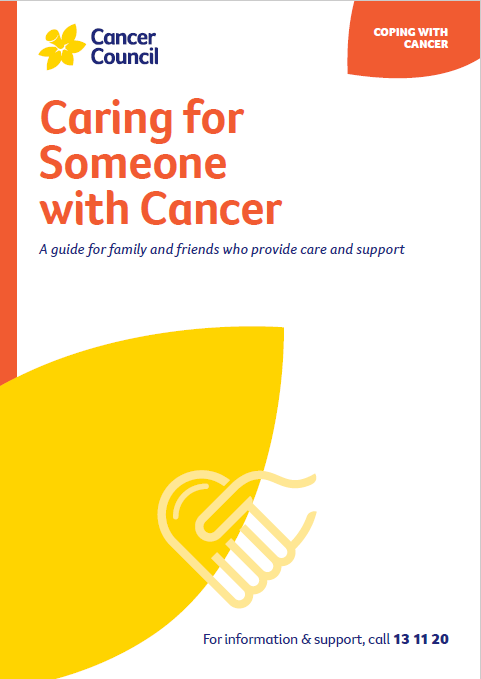- Home
- About Cancer
- Living well
- Nutrition and cancer
- Caring for someone with cancer
Caring for someone with cancer
If you’re caring for someone with cancer, you may need to help them manage eating issues caused by the cancer and its treatment.
Learn more about:
- Overview
- Tips for preparing if you are a carer
- If your child has cancer
- Looking after yourself
- Podcast: How to help someone with cancer
Overview
It’s natural to worry that the person you’re caring for isn’t eating well or is losing weight, but try to avoid tension about food, as this may only increase their anxiety and yours. They are likely to feel upset that they can’t finish or eat a meal you’ve prepared. There are many reasons why someone may not feel like eating.
Read about different ways of coping with eating issues.
Tips for preparing food if you are a carer
- Ask them what they’d like to eat.
- Gently encourage them to eat foods that are high in kilojoules and protein when they are feeling well.
- Serve small amounts of food at a time and freeze the leftovers.
- Have ready-to-eat food available for when they feel like eating (e.g. tinned fruit, yoghurt, frozen meals).
- Keep mealtimes flexible and be willing to try new ideas or recipes.
- Offer their favourite foods at the times when you know their appetite is good.
- Make meals as enjoyable as possible – play music, set the table with candles and flowers.
- Take care to prepare food safely.
- Accept that during treatment the focus of the person with cancer may need to be on simply eating something, rather than on eating nutritious food all of the time.
If your child has cancer
The nutritional needs of children with cancer are different to adults, as children continue to grow and develop during treatment. The treatment team will monitor the weight and growth of your child closely during treatment.
Be flexibleLet your child eat when they feel like it, not just at mealtimes. Be flexible in what they eat, e.g. allow your child to have the same foods often or breakfast cereal for dinner if that’s what they prefer. | |
Offer nutritious foodTry not to make an issue of your child’s lack of appetite. Instead, encourage them to eat nutritious, high-kilojoule foods when they are feeling well. | |
Allow occasional treatsDuring treatment, any nourishment is better than none. Allow your child to eat fatty or sugary foods like cake, chips, chocolate and takeaway occasionally. | |
Eat at the tableDiscourage your child from eating in front of the television or computer as it can be distracting. | |
Make mealtimes funFocus on making mealtimes as relaxed as possible and see them as an opportunity to come together to share stories and discuss any concerns. Regular family meals also give a child a sense of stability. |
Looking after yourself
Being a carer can bring a sense of satisfaction, but it can also be exhausting and stressful. Trying to prepare food for someone who is having trouble eating can be especially challenging.
It is important to look after your own wellbeing, so you also need to eat well and get some exercise. Give yourself some time out and share your concerns with somebody neutral such as a counsellor or your doctor, or call Cancer Council 13 11 20.
There is a wide range of support available to help you with both the practical and emotional aspects of your caring role.
Support services – Support services such as Meals on Wheels, home help or visiting nurses can help you in your caring role. You can find local services, as well as information and resources, through the Carer Gateway. Call 1800 422 737.
Support groups and programs – Many cancer support groups and cancer education programs are open to carers as well as to people with cancer. Support groups and programs offer the chance to share experiences and ways of coping.
Carers Australia – Carers Australia provides information and advocacy for carers.
Cancer Council – You can call Cancer Council 13 11 20 or visit your local Cancer Council website to find out more about carers’ services.
For more on this, see Caring for someone with cancer.
Podcast: How to Help Someone with Cancer
Listen to more of our podcast for people affected by cancer
Video: Eating well after a cancer diagnosis
More resources
Jacqueline Baker, Senior Oncology Dietitian, Chris O’Brien Lifehouse, NSW; Lauren Atkins, Advanced Accredited Practising Dietitian, OnCore Nutrition, VIC; Dr Tsien Fua, Head and Neck Radiation Oncology Specialist, Peter MacCallum Cancer Centre, VIC; Rosemerry Hodgkin, 13 11 20 Consultant, Cancer Council WA; Clare Hughes, Manager, Nutrition Unit, Cancer Council NSW; John Spurr, Consumer; Emma Vale, Senior Dietitian, GenesisCare, SA; David Wood, Consumer.
View the Cancer Council NSW editorial policy.
View all publications or call 13 11 20 for free printed copies.

